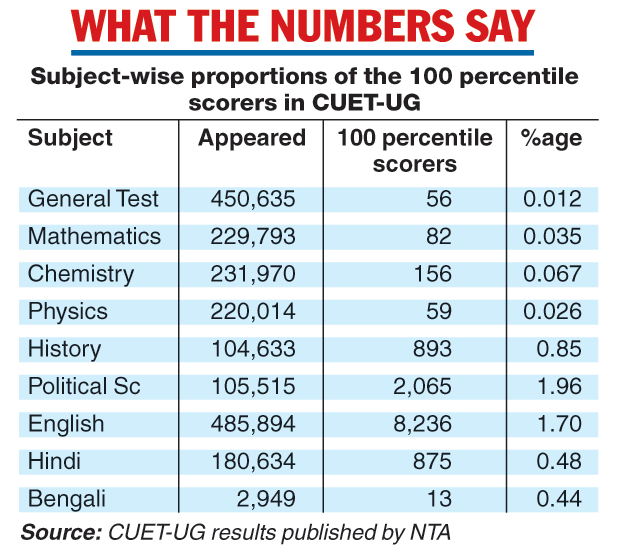Students seem to have found the General Test the toughest of all in the maiden Common University Entrance Test-Undergraduate (CUET-UG), going by the poor proportion of 100 percentile scorers in the paper and the reactions of some candidates who spoke to this newspaper.
Of all the 61 subjects offered in the exam, the General Test paper witnessed the lowest proportion of 100 percentile scorers (joint top scorers) at less than one in 8,000.
The proportions of joint top scorers have been poor also in science subjects such as physics, chemistry and mathematics compared with the humanities and social sciences in general. (See chart)

While the proportion of joint top scorers is only an approximate indicator of overall student performance in a paper – because one very high scorer may skew it and because it says nothing about the absolute scores obtained – many students told The Telegraph they found the General Test very difficult.
Most of them said the paper — which tested the students for knowledge of current affairs, numerical ability, logical thinking and analytical reasoning — was a new concept and had no specific textbook.
“It covers a broad area from arithmetic to world affairs,” said Shivangi Rewaria, a candidate.
“I found the general test somewhat difficult, especially the mathematics and numerical reasoning sections. The root cause of the issues we faced with the general test was the vague nature of the syllabus provided by the NTA for the paper.”
Dhaani Khurrana, another candidate, said: “My overall experience with the General Test was all right. However, I did find a few questions somewhat tricky. My main complaint would be that we were given only an hour’s time for a test that had largely mathematics-related questions, for which the calculations took considerable time.”
In all the subjects, candidates had to attempt any 40 of 50 questions, except for the General Test where 60 questions were to be attempted out of 75.
Of the nearly 6.26 lakh candidates who took the CUET-UG, the total number of 100 percentile scorers across subjects was 21,159. They included 15,373 from the general category, 3,547 from the OBC (non-creamy-layer) category, 1119 from the Economically Weaker Sections, 859 from the Scheduled Castes and 261 from the Scheduled Tribes.
While far less than 0.1 per cent of candidates secured 100 percentile scores in mathematics, physics and chemistry, subjects like political science and English witnessed nearly two per cent 100 percentile scorers.
This was the first time the National Testing Agency, which conducted the CUET-UG, had set papers in humanities and social science subjects – which some candidates suggested could be a reason for easier questions being asked in these subjects.
The NTA has for some years been conducting tests in science subjects for the Joint Entrance Examination Main and the National Eligibility-cum-Entrance Test-Undergraduate – the all-India entrance tests for engineering and medical undergraduate courses.
The CUET-UG provided a lot of flexibility, with each student permitted to appear in up to nine subjects – allowing them a wide spectrum of courses to apply for.
The exam was conducted in 13 languages: English, Hindi, Assamese, Bengali, Gujarati, Kannada, Malayalam, Marathi, Odia, Punjabi, Tamil, Telugu and Urdu. Of the 2,949 candidates who appeared in the Bengali language paper, only 13 (0.44 per cent) scored 100 percentile.
The CUET-UG was held in 490 centres across 259 cities in India, and in 10 cities abroad.
“The role of the NTA is confined to the registration of candidates, conduct of the test, hosting of answer key, inviting challenges, finalising answer keys, preparing and declaring result and hosting Score Card. Merit list will be prepared by participating universities/ organisations,” an NTA release said.
This year, the central universities will admit undergraduate students via the CUET-UG.










